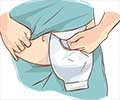How can you Treat Neck Cracking?
Neck cracking can be harmful when you don’t do it correctly or if you do it frequently. Here are a few ways to follow to protect yourself from any damage caused by neck popping.
- Treat the underlying condition, such as neck arthritis, osteoporosis or any structural deformity
- Apply ice and heat alternately on the painful area. This increases blood flow to the area and helps reduce inflammation
- Perform gentle yoga postures such as cat-cow stretch, cobra pose
- Stretch your neck muscles. Neck movements such as gently moving the head sidewise, up and down, moving your head in circles, first clockwise and then counterclockwise, shrugging and rolling the shoulders are helpful
- Strengthen your neck muscles. Tie an elastic exercise band around your head and attach it to a firm object at the level of your head. Walk a few steps away until you feel the tension in the exercise band
- Nonsteroidal anti-inflammatory drugs (NSAIDs) such as
ibuprofen , naproxen - Acupuncture may prove helpful in reducing discomfort and swelling
- See a chiropractor or osteopath
How to Prevent Neck Cracking?
Neck cracking can be prevented with regular stretching and strengthening exercises, proper posture, using orthopedic mattress and pillows. It is necessary to understand what activities are causing the issues in the neck, so that appropriate measures can be taken accordingly.
Stretching is a good exercise, which helps loosen and relax your neck muscles. Also, stretching can help reduce your neck cracking habits.

- Regular exercise and stretching
- Break the neck cracking habit
- Take breaks every hour if your desk work requires long periods of time
- Adjust the computer screen to the front and at eye level
- Use the speakerphone function instead of tilting head to hold the phone in place
- Change the position of your car seat so that your head can rest comfortably against the headrest
- Change your workout routine
- Change the sleeping position. Sleeping on your side with your hips and knees slightly flexed may prove beneficial
- Use an orthopedic pillow and mattress designed to support the natural curves of your neck
- Consult a mental health professional if no physical issues exist in your neck and psychological issues are suspected









